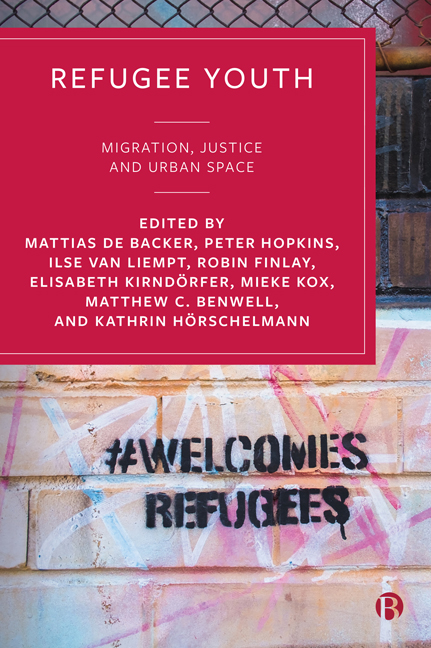Book contents
- Frontmatter
- Contents
- List of Figures and Tables
- Notes on Contributors
- Acknowledgements
- 1 Introducing Refugee Youth: Migration, Justice and Urban Space
- 2 Storying Belonging, Enacting Citizenship? (Dis)articulations of Belonging in a Community Theatre Project with Young Refugees and Asylum Seekers in Leipzig, Germany
- 3 Jackets and Jewellery: Racialised Dispossession and Struggles over Public Space in Denmark
- 4 Venezuelan Refugee Youth and Brazilian Schooling: The Individual between Languages and Spaces
- 5 The Inclusionary Potential and Spatial Boundaries of (Semi-)Public Space: Refugee Youth’s Everyday Experiences in the Urban Fabric of Amsterdam
- 6 Navigating ‘Purdah’ Culture in Urban Space: The Restricted Lives of Young Married Rohingya Refugees in Malaysia
- 7 Inclusive Urban Planning and Public Space for Refugee Youth in Pursuit of a Just City in Amman, Jordan
- 8 Sense of Belonging among Tibetan Refugees in India: A Case Study of the Bylakuppe Settlement in Karnataka, India
- 9 Negotiating Identity in Urban Space: Everyday Geographies of Syrian Students in Istanbul
- 10 ‘You’re Judged a Lot’: Australian Sudanese and South Sudanese Youths’ Perspectives on Their Experiences in Public Spaces
- 11 Hair Salons as ‘Private-Public Spaces’: Exploring the Experiences of Young Migrant Women in an Urban Township in South Africa
- 12 Emotion and Spatial Belonging: Exploring Young Migrant Men’s Emotional Geographies in Cork, Ireland
- 13 Homemaking through Music in Urban Africa: Creating Opportunities as a Refugee and a Migrant in Kinshasa and Dar es Salaam
- 14 Planetary Listening
- 15 Refugee Youth: Politics, Publicness and Visibility
- Index
12 - Emotion and Spatial Belonging: Exploring Young Migrant Men’s Emotional Geographies in Cork, Ireland
Published online by Cambridge University Press: 18 January 2024
- Frontmatter
- Contents
- List of Figures and Tables
- Notes on Contributors
- Acknowledgements
- 1 Introducing Refugee Youth: Migration, Justice and Urban Space
- 2 Storying Belonging, Enacting Citizenship? (Dis)articulations of Belonging in a Community Theatre Project with Young Refugees and Asylum Seekers in Leipzig, Germany
- 3 Jackets and Jewellery: Racialised Dispossession and Struggles over Public Space in Denmark
- 4 Venezuelan Refugee Youth and Brazilian Schooling: The Individual between Languages and Spaces
- 5 The Inclusionary Potential and Spatial Boundaries of (Semi-)Public Space: Refugee Youth’s Everyday Experiences in the Urban Fabric of Amsterdam
- 6 Navigating ‘Purdah’ Culture in Urban Space: The Restricted Lives of Young Married Rohingya Refugees in Malaysia
- 7 Inclusive Urban Planning and Public Space for Refugee Youth in Pursuit of a Just City in Amman, Jordan
- 8 Sense of Belonging among Tibetan Refugees in India: A Case Study of the Bylakuppe Settlement in Karnataka, India
- 9 Negotiating Identity in Urban Space: Everyday Geographies of Syrian Students in Istanbul
- 10 ‘You’re Judged a Lot’: Australian Sudanese and South Sudanese Youths’ Perspectives on Their Experiences in Public Spaces
- 11 Hair Salons as ‘Private-Public Spaces’: Exploring the Experiences of Young Migrant Women in an Urban Township in South Africa
- 12 Emotion and Spatial Belonging: Exploring Young Migrant Men’s Emotional Geographies in Cork, Ireland
- 13 Homemaking through Music in Urban Africa: Creating Opportunities as a Refugee and a Migrant in Kinshasa and Dar es Salaam
- 14 Planetary Listening
- 15 Refugee Youth: Politics, Publicness and Visibility
- Index
Summary
Introduction
Exploring home in migration research has become a vast field that has developed in different directions. An important and interesting aspect of this area is understanding the concept of home from and within dynamics of public spaces, where migrants are physically and emotionally in the presence of others. Public space, in understanding the relationship between emotions and home, is less explored than domestic space, where people construct more private and intimate relationships with objects, close members of family or others, and interior spaces of home. This chapter focuses on ‘spatial belonging’ as it forms in the exteriors of domestic homes for young male migrants who live in Cork, Ireland. The chapter is based on a recent ethnography, Youth-Home, that I conducted with young migrant men on the notion of home. Here, I focus on participants’ significant emotions that are involved in relation to the notion of home in Cork. The chapter first draws on recent literature on emotional geographies of home, before moving on to the methodological approach taken in this study and a presentation and discussion of findings.
Emotional geographies of home: a theoretical framework
‘Home’, as a central concept in sociology and the geography of migration, has developed in different directions (Ahmed et al, 2003; Basu, 2004; Walsh, 2011; Kochan, 2016; Boccagni, 2017; Geurts et al, 2021). In much of this multidisciplinary literature, the concept of home is understood in a wider sense than a house or a dwelling (Mallett, 2004) and is more commonly equated to a place of belonging and familiarity (Ahmed, 1999; Savaş, 2010). It is also linked to a longing for one's ‘homeland’, where ties to past lives and identification with the ‘country of origin’ inform practices and feelings after migration (Flynn, 2007). Home also encompasses a variety of ‘the sensory world of everyday experience’ (Ahmed, 1999, p 341; Vanni Accarigi, 2017). Home is an ‘ambiguous site’ (Schroder, 2006) that is composed of the interconnection between protective and limiting characteristics at the same time. Mallett (2004) argues that ‘home is a place but it is also a space inhabited by family, people, things and belongings – a familiar, if not comfortable, space where particular activities and relationships are “lived” ‘(Mallett, 2004, p 63).
- Type
- Chapter
- Information
- Refugee YouthMigration, Justice and Urban Space, pp. 190 - 208Publisher: Bristol University PressPrint publication year: 2023



